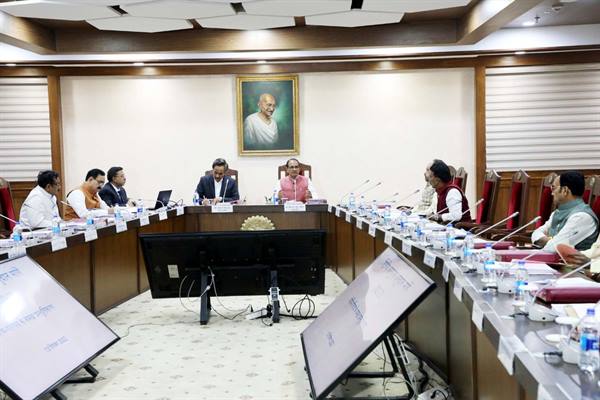
Team News Riveting
Bhopal, December 13
In a meeting chaired by Chief Minister Shivraj Singh Chouhan at the Mantralaya today, the Cabinet approved the first policy related to science, technology and innovation in the state.
In the present era, new technology and technique are being used in every field related to life. Many such new technologies are available, which can be used in various fields such as land management, agriculture, industry, energy, environment, education, health, minerals, beneficial schemes, infrastructure, etc. and positive results can be achieved.
Productivity can be increased by adopting new technologies in various departments and government services can also be made available to the citizens in an easy and transparent manner.
Due to the above reasons, a need was felt to formulate the M.P Science, Technology and Innovation policy. The policy seeks to create scientific outlook in the state, strengthen innovation ecosystem, promote science and technology enabled entrepreneurship, strengthen government services using new technology, preserve traditional knowledge systems and initiate and encourage inclusion and participation.
The key objectives of this policy are to position Madhya Pradesh as the top Science, Technology and Innovation (STI) destination in the country. To place Madhya Pradesh among the top 5 states in the ‘India Innovation Index’ by the year 2030 (from its current rank of 13) by strengthening factors such as human resources, investments, and knowledge-based manpower. To help Madhya Pradesh increase knowledge-based production in the state by strengthening indicators such as research publications, innovations, startups, industrial design innovations and patents by developing an effective STI ecosystem. Increase the overall state expenditure on science and technology and encourage private investment in R&D related areas in the state. To promote a spirit of healthy competition among educational and research institutions of Madhya Pradesh and to provide incentives for obtaining prestigious national and international science and technology awards, (such as the ‘Shanti Swarup Bhatnagar Prize for Science and Technology (SSB). To increase the enrollment ratio in STEM courses at undergraduate, postgraduate and PhD levels by promoting STEM education, especially among girl students, right from the primary level by enriching the curriculum with STEM experiments and competitions. To develop a model framework for conservation and promotion of traditional knowledge system through scientific validation and commercialization. To promote innovations according to the needs of the ground level. To promote growth through innovation in economic sectors such as agriculture, healthcare, education and energy, and to create the necessary research, development and innovation infrastructure to encourage private enterprise in these sectors. To ensure home delivery service availability by accurate assessment of public needs by developing proactive, efficient and transparent G2C and G2B systems based on innovative technologies. To be at the forefront of skill enhancement by creating world class human resource in new and emerging technologies like Metaverse, Quantum Computing, 5G Semiconductors, IoT, Blockchain and Distributed Laser Technologies, AI and AR/VR. By taking advantage of the huge data warehouse available in the government domain, keeping in view the requirements of privacy protection to create an effective and responsive innovation ecosystem for fostering data driven startups by creating an accessible sandbox environment. To promote national and international linkages to facilitate acquisition, transfer, adaptation and use of new and advanced technologies. Apex institutes (like IITs, IIMs, AIIMS, NITs, IIICs) to promote contextual innovation and science education Institutes (IT, NID, NIFT, NLS) will be encouraged to adopt a district of Madhya Pradesh and promote science and innovation locally in that district. Innovation Clusters, incubators and accelerators will be set up in premier institutions (like ITIs, IIITs, etc.) to help startups avail seed-funding mentorship, training and best practices through collaboration with the private sector.
Land allotted for industrial development in Mohsa-Bawai
The Cabinet has taken the following decision regarding allotment of land of industrial area Mohasa Babai to various industries. Permission has been given to reserve 227.54 acres of area in Mohasa-Babai for the manufacture of energy and renewable energy equipment under the scheme of the Government of India.
Permission has been granted for allotment of land on 2458.686 acres of allocable land in Mohasa-Babai for industries of textile, garment, food processing and other sectors. With a view to ensuring availability of industrial land in specific location to the committed investors for setting up units in industrial area Mohasa-Babai, the allotment of plots has been approved through offline method while relaxing the online method of allotment of land under the M.P.State Industrial Land and Building Management Rules, 2014.
The units will have to submit the application in the prescribed format as per rules to Regional Office, MPIDC Bhopal. After examining the application by the Regional Office, it will be forwarded to the Managing Director, MPIDC. The decision for allotment of land to the concerned units will be taken by the committee constituted under the chairmanship of Principal Secretary, Industrial Policy and Investment Promotion Department. Employment-oriented units like textile and garment sector, food processing will be identified in priority category for allotment of land in the industrial sector. The units to be set up in the Mohasa-Babai industrial area will be eligible to get other benefits/facilities as per the provisions of the policy except the facilities related to electricity tariff and electricity duty as per the prevalent industrial policy.
The units proposed to be set up in Mohasa-Babai will not have the facility to obtain additional waiver of concession related to land acquisition/development fee separately from the Cabinet Committee on Investment Promotion (CCIP). The unit will not be eligible to get exemption/concession in the value of land as per Madhya Pradesh State Industrial Land and Building Management Rules, 2019 i.e. the unit’s land acquisition equal to the actual value of the land will be as per Madhya Pradesh State Industrial Land and Building Management Rules, 2019.
If there is any order regarding waiver of premium (prabyaji) and development fee for the allotment of the plot, the said order will not be effective in the industrial area Mohasa-Babai. Contract related to power supply from proposed/established units in Mohasa-Babai will be executed under the instructions and regulation of Madhya Pradesh Electricity Regulatory Commission. Due to establishment of big textile and garment units in Bhopal, Mandideep and Budni, land is being demanded by textile companies like Best Corporation, Indorama, Mahima Fibres, Vardhaman etc. in Mohasa-Bawai industrial area.
Land allotment for airport in Rewa
Currently available 64 acres of land has been allotted to the Indian airport to develop the Rewa airstrip as an airport. Apart from this, approval was given by the Council of Ministers to acquire the required 99.615 hectares of land from the state government and hand it over to the Airport Authority of India. The entire infrastructure for the airport will be developed by the Airport Authority of India, for which an action plan has been prepared by them and the construction agency has been selected. After the development of Rewa airstrip as an airport, the landing of Boeing aircraft like A.T.R. will be possible, due to which the economy and tourism of Rewa region will get a boost, this will directly benefit the general public.
Private University Amendment Bill
The Council of Ministers approved the Madhya Pradesh Private University (Establishment and Operation) Second Amendment Bill, 2022. The Second Amendment Bill, 2022 presented in connection with the establishment of Scope Global Skills University, Bhopal, Abhyudaya University, Khargone and Azim Premji University, Bhopal universities through the Bill was approved by the Council of Ministers.
Amendment in Madhya Pradesh Store Purchase and Service Procurement Rules 2015
A lot of time has passed since the M.P. Stores Purchase and Service Acquisition Rules 2015 came into force. Over the years, due to the changes and new challenges in the global scenario, the rules issued by the Government of India in General Financial Rules 2017 regarding material procurement have been revised. With the objective of development and providing assistance to micro and small enterprises in Section 11 of the Micro, Small and Medium Enterprises Development Act, 2006, provisions related to preference in procurement of goods/services, on the basis of emergence and importance of startups in the global and local economic scenario in view of the need for amendment, deletion and inclusion of new provisions in the prevalent rules, the Cabinet has decided that the state government will release the M.P. Store Purchase and Service Acquisition Rules 2015 (as amended in 2022).
Firms accused of irregularities like work contrary to the terms of the tender, taking protective measures, corruption etc. will be blacklisted. MSMEs startups of the state whose production capacity is twice the government’s demand for these products, can be reserved for 100 percent purchase. Services can be procured directly from Madhya Pradesh Medium, Tourism Development Corporation, Textbook Corporation, Electronic Development Corporation, CEDMAP, Health Service Corporation and Dairy Federation without inviting tenders.
Madhya Pradesh Land Revenue Code (Second Amendment) Bill 2022
The Cabinet approved the Madhya Pradesh Land Revenue Code (Second Amendment) Bill, 2022 and authorized the Revenue Department to take all necessary steps to pass the bill by introducing it in the Vidhan Sabha. Tehsildar is the competent authority to deal with demarcation matters. An amendment is proposed in the Madhya Pradesh Land Revenue Code to limit the number of revenue inspectors in the state and for speedy disposal of demarcation applications. Now on the demarcation application by the Tehsildar, the report of the Revenue Inspector/Town Surveyor as well as the Town Patwari can also be taken.
Swarozgar Yojana 2022-23 for Denotified, Nomadic and Semi-nomadic communities
The Cabinet has approved Mukhya Mantri Vimukt, Ghumantu and Ardha-Ghumantu Swarozgar Yojana for the year 2022-23 for the economic and social upliftment of the people belonging to the Denotifed, Nomadic and Semi-Nomadic communities of the state. In the scheme run by the department, the scheme will be run in two parts. Loans up to Rs 1 lakh will be made available through banks in individual cases through the department and agency. In case of self-help groups, loans up to Rs 10 lakh will be made available through banks. Six percent subsidy on interest rate on 25 percent of the loan taken for the first time or a maximum of Rs. 20 thousand (individual case) and Rs. 2 lakh (self-help group) grant. Loans through banks and grants-in-aid through agencies will be made available to the trained youths for employment by ITI in the scheme run by the agency. Cases will be approved in the individual category with a maximum of Rs 2 lakh. 25 percent of the project cost on the first loan and 20 percent subsidy on the second loan. Six percent subsidy on interest on first and second loan.
Madhya Pradesh Municipal Law (Fourth Amendment) Bill 2022
Madhya Pradesh Municipal Law (Fourth Amendment) Bill 2022 is being brought for effective control over stray animals in urban bodies. In the said Bill, it has been proposed that any person who willfully or negligently leaves or ties any cattle or other animal loose on any public road or place, causing injury to any person or damage to property or obstructing or endangering public traffic or causes public nuisance, shall be punishable with fine, which shall not exceed Rs one thousand, as may be prescribed by the state government.’
Unnecessary and useless laws to be repealed
The state government in Madhya Pradesh is committed to repeal unnecessary and useless and ineffective laws. Once enacted, it will reduce redundant and ineffective laws. 05 Acts mentioned in the schedule of Madhya Pradesh Repeal Bill, 2022 have been repealed. Through this, the following 5 Acts are to be repealed, which have become completely obsolete, unnecessary and unimportant. Madhya Pradesh Borstal Act 1928, Madhya Bharat Small Litigation Court Act 1949, Madhya Pradesh Industries State Assistance Act 1958, Madhya Pradesh Horse Disease Act 1960, Madhya Pradesh Animal (Control) Act 1976.
Ban on cigarettes and other tobacco products
The Council of Ministers approved the State Amendment Bill 2022 of the Cigarettes and Other Tobacco Products (Prohibition of Advertisement and Regulation of Trade and Commerce, Production, Supply and Distribution) Act, 2003 in the state of Madhya Pradesh and permission was granted to send it to the Ministry of Home Affairs, Government of India for the prior approval of the Honorable President, prior to its reinstatement in the Vidhan Sabha.
Other decisions
Madhya Pradesh Cinema (Regulation) Act, 1952 Section 2 has been assigned in Clause (34-A) of Section 5 of the M.P. Municipality Act 1956 and Clause (18-A) of Section 3 of the M.P. Municipalities Act, 1961.
Provision has been made for a penalty of Rs.50,000/- instead of Rs.1,000/- as provided in the Section 7 and Rs.5,000/- instead of Rs.100/- per day in which the offense continues by amending section 4, the Commissioner, Municipal Corporation within the limits of the Municipal Corporation, and the Municipal Council, the District Magistrate or any Executive Magistrate authorized by the District Magistrate for the areas falling within the limits of the Municipal Council.



